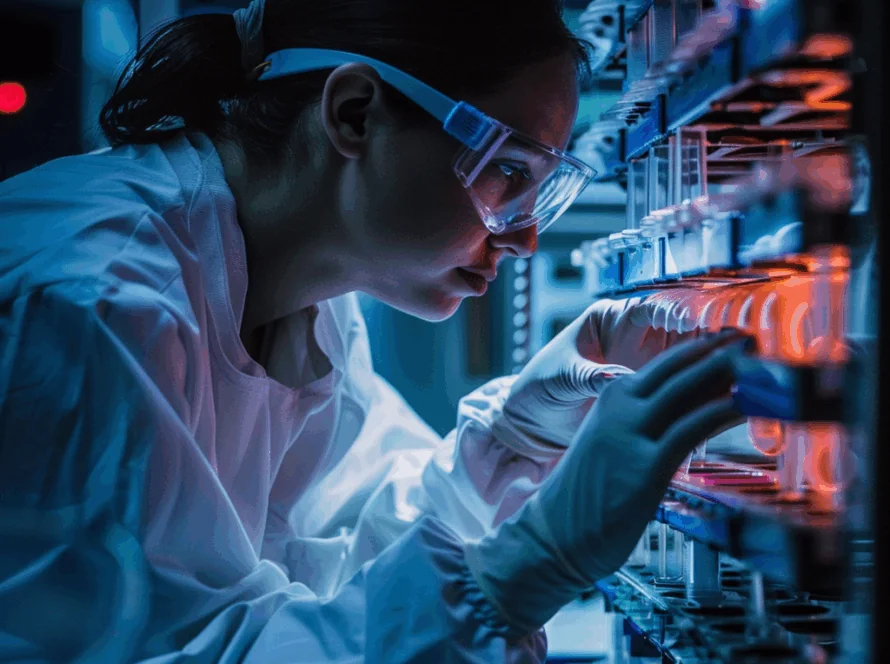A scientific and regulatory shift toward in vitro models
The global transition away from animal experimentation is accelerating. Both the European Directive 2010/63/EU and the FDA Modernization Act 2.0 actively promote the replacement of animal models with new in vitro approaches. Agencies such as the EMA and NIH now support the adoption of advanced three-dimensional cell culture systems, including organoids and stem cell aggregates, to generate data that better reflect human biology.
While the ethical imperative is widely accepted, a technological limitation remains. Conventional bioreactors using impellers or bubbling systems expose cells to high mechanical stress, often exceeding 250 to 600 millipascals. This level of shear force damages fragile cell types such as pluripotent stem cells, organoids or immune cells, altering their gene expression and compromising their physiological integrity.
The challenge for modern biology is to reproduce living tissue behavior in vitro without inducing stress or variability. The solution now exists through Cellura’s SoftXS™ technology, which enables stable, scalable and reproducible cell growth under extremely gentle flow conditions.
A nature-inspired breakthrough for gentle and scalable 3D culture
Developed from over ten years of CNRS and INSERM research, the SoftXS™ bioreactor reproduces the Earth’s rotation and precession to create a natural, chaotic yet gentle mixing of fluids. Unlike conventional systems, SoftXS™ contains no blades or impellers. Its mixing relies on resonance, ensuring homogeneous nutrient distribution while maintaining extremely low shear levels — between 30 and 60 mPa, up to 50 times gentler than in a stirred-tank reactor.
This breakthrough allows the cultivation of the most delicate cell types:
iPSCs: 100-fold amplification in 7 days with >99% preserved pluripotency
Organoids: functional thyroid organoids formed in 15 days
Natural Killer cells: 10-fold amplification in 7 days under single-cell form
Microcarriers: gentle resuspension at 30–60 rpm
Microalgae (dinoflagellates): one billion cells per litre in six days
These results, validated by Professor Annelise Bennaceur (INSERM, CITHERA) and Professor Ali Turhan (AP-HP, Inserm U935), confirm that SoftXS™ preserves cellular integrity while ensuring perfect reproducibility and scalability from 125 mL to 200 L without redesign.
Meeting market, ethical and industrial expectations
The 3D cell culture market now exceeds 3.5 billion USD, growing more than 20% per year. Yet scalability, reproducibility, and compliance with new ethical regulations remain critical barriers. Cellura directly addresses these issues through a platform combining reliable low-shear hydrodynamics with a GMP-compatible design.
Key advantages include:
Constant shear forces across all culture volumes
GMP-native architecture for clinical-grade processes
2–4× lower media consumption than conventional systems
Compact, plug-and-play integration into standard incubators
Compatibility with all major cell types — stem cells, organoids, immune cells, microalgae
By offering physiologically relevant and reproducible in vitro models, Cellura enables researchers, biotechs, and pharmaceutical companies to achieve both ethical compliance and industrial performance.
From research to industrial application
SoftXS™ has already proven its capacity to replace animal-based models in diverse fields:
Oncology: creation of patient-derived tumor organoids for drug testing, mirroring clinical biopsies.
Neuroscience: generation of 3D neuronal networks reproducing neurodegenerative mechanisms without animal models.
Toxicology: use of standardized human spheroids for chemical safety testing.
Ecotoxicology: culture of sensitive marine microalgae as environmental bioindicators.
Cellular agriculture: expansion of animal progenitor cells for cultivated meat development without animal sacrifice.
These applications illustrate how a single platform can drastically reduce animal use while enhancing scientific precision. The SoftXS™ system guarantees high viability, consistency, and traceability throughout the process, from research to full-scale biomanufacturing.
A new ethical standard for biotechnology
Animal experimentation has reached its scientific and moral limits. The future of research and biomanufacturing lies in reproducible, physiologically accurate, and scalable 3D systems.
With its geo-inspired, low-shear mixing technology, Cellura’s SoftXS™ bioreactor marks a decisive step in this transition. It provides a platform that preserves the natural behavior of living cells while enabling industrial-scale production under controlled, ethical conditions.
By merging scientific rigor, industrial practicality, and ethical responsibility, Cellura defines a new standard for modern biotechnology — one in which animal testing is replaced by reliable and sustainable in vitro models.






